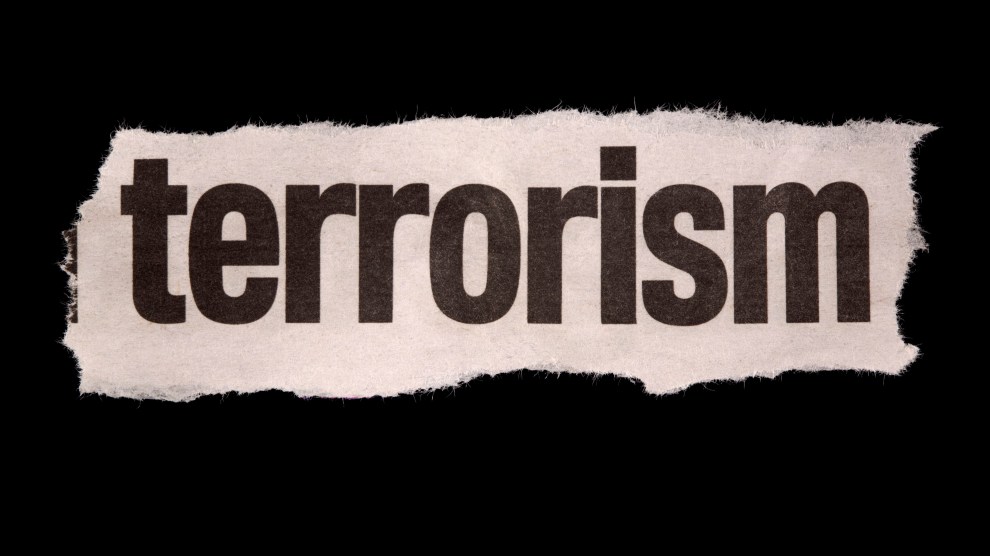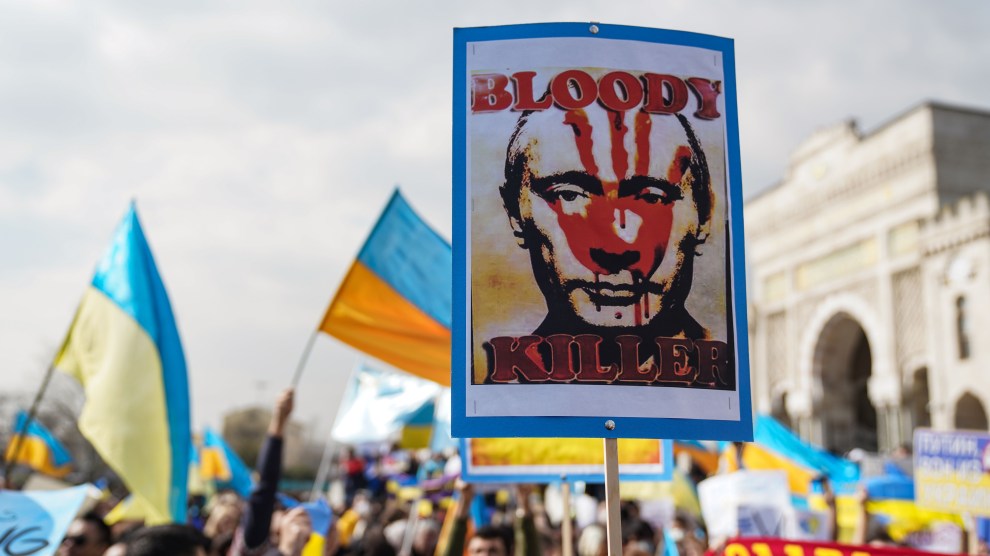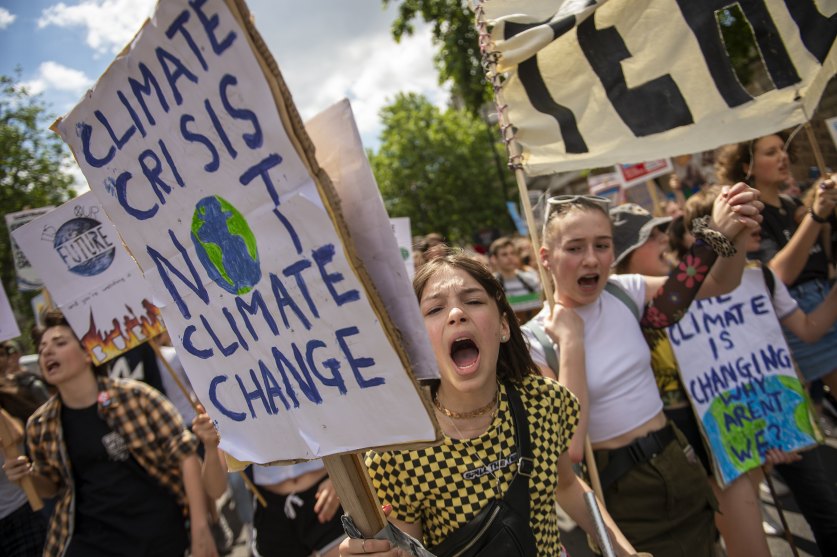
Belterz/Getty
Last week, a leaked staff memo from the director of journalistic standards and public trust at Canada’s largest broadcaster drew wide attention for instructing reporters, “Do not refer to militants, soldiers, or anyone else as ‘terrorists.’”
“Terrorism remains heavily politicized” and is too subjective and slanted a word for reporters to use outside of attributed quotes and narrow exceptions, the Canadian Broadcasting Corporation cautioned. It told reporters to “use fact-based language” instead—and said calling Hamas, or anyone, a terrorist group is “opinion, not fact.”
The don’t-say-terrorist directive was distributed just hours after Hamas deployed militants to kidnap, mutilate, and kill elementary school children and other noncombatants in a plot whose civilian targeting was confirmed as intentional by Hamas itself. But the CBC’s policy was firm. Its leak was delivered into the waiting arms of media critics who pounced on it as fresh evidence of a tendency in the media to timidly euphemize, equivocate, or willfully resist naming terrorism.
The CBC wasn’t alone. The BBC also issued don’t-say-terrorist statements: “We don’t take sides” and “we don’t talk about ‘terrorists,’” world affairs editor John Simpson said, because avoiding the word helps “to keep the trust of all our audiences.”
A BBC reporter resigned in protest of that policy, saying his newsroom’s “refusal to use the correct terminology is unjustified” and damages audience trust.
Relitigating this word, and the familiar refrain of down-the-middle equivalency, has a long history and a long critique. The battle lines are well-drawn. But with fresh blood spilling across Israel and Gaza, calls to avoid the word or say it louder are growing. In a statement to me from Chuck Thompson, head of public affairs and chief of staff to the executive vice president at the CBC, he upheld his newsroom’s don’t-say-terrorist policy and welcomed pushback: “We certainly don’t expect to change strongly held opposing views on this subject and deeply respect where people are coming from.”
The BBC and CBC join major US newsrooms in grappling openly with the word: The New York Times drew eyes for changing “Hamas terrorists” to “Hamas gunmen” in an article, then adding “terrorists” back in. Asked for the Times’ style guidance, a spokesperson told me, “Our coverage on the events so far is the best reflection to reference” for the paper’s approach, rather than a standalone style memo.
CNN, NBC News, and ABC News prominently headline the word, but the Guardian’s style guide hedges: “One person’s terrorist may be another person’s freedom fighter.” That stance is shared by another newsroom’s internal memo, shown to me on the condition that I don’t name the newsroom: “‘Terrorism/terrorists’: Do not use. One person’s terrorist is another’s freedom fighter.”
“The most important thing is that, in news reporting, we are not seen – because of the language we use – to be taking sides,” the Guardian’s style guide says.
The most important thing?
The echoes of equivocation and staking of a middle ground—where reporters’ role is reduced to chronicling what each side says in words least offensive to most “sides”—reverberate. This war is wearing on, and its equivalency fallacy is wearing thin. As my colleague Monika Bauerlein has unpacked many times, and as media critic Jay Rosen has said, one of the media’s recurring mistakes is taking a “view from nowhere” that casts all sides in a story as a contest between equivalent claims.
Rosen sees value to following a clear definition and the facts where they lead, rather than some blanket ban. The word is “useful when used with precision” and “should neither be banned nor strewn about,” he tells me.
But objections are sharp. Media critic Hamilton Nolan argues to retire it: “‘Terrorist’ is, in essence, a slur. It defines its subject from the outset as a villain” and too readily serves “war on terror” propaganda. And its definitions are hardly uniform but almost always require violence be done by non-state actors, making states conveniently incapable of it—though “state terrorism” caught on for Libya’s orchestration of civilian violence beyond its borders. And “state-sponsored terrorism” is common in Hezbollah reporting.
“Terrorism, as a term, should never be retired,” reporter and media critic Terrell Jermaine Starr tells me. “The act is alive and well and will be for some time.”
For Starr, whose war correspondence from Ukraine and earlier commentary at The Root focus on politics and race, “terrorism and terrorist should be used to describe actions and actors. It is perfectly acceptable to describe Hamas’ actions as terrorism and the group and its people as terrorists.”
“The problem,” he says, “is that Western hegemony informs newsroom editorial policy and description in ways many media leaders will never admit. We don’t assign the word terrorism as often to white people as we do to Arabs and Muslims (or Israel) because the national discourse tends to place a higher threshold on terroristic violence when non-POC actors are at play: international law is summoned and all of the boxes must be checked.”
Much of the word’s radioactivity comes from that hard objection: the racialization of terrorism; the selective vilifying of whichever group you want to cast as terrorizing and the pass you might give groups you ally with, definitions be damned. This is a strong objection, but it’s a reason to use the word more credibly and consistently, not bury it.
“Terrorism” also lends itself to a former president of the United States.
Donald Trump has engaged in stochastic terrorism, in the assessment of national security experts. By stirring up the January 6 Capitol attack and unleashing a domestic terrorism movement, Trump used a method of inciting violence where the instigator provokes it under the guise of plausible deniability, as my colleague Mark Follman has reported. If you’re prepared to retire “terrorist” for Hamas and everyone else, you’d better be prepared to absolve Trump of the stochastic label on a continuum.
Voiding the word assumes, and acquits, a view from nowhere.
Taking a view from somewhere is what moved Mother Jones to publish our style guide and register the word’s value. As I noted then, equivalencies like “One person’s terrorist is another’s freedom fighter” are a familiar misstep from down-the-middle editors with good intentions but flawed framing. The word is as descriptive of white supremacist terrorists as of Hamas terrorists and anyone else who meets a broadly shared or exacting definition based on intent, method, and impact. The word is no more innately subjective or bluntly bigoted an instrument of empire than its closest alternatives. Allow and use it precisely. Banning would only confirm the serious charge that progressive-posturing reporters resort to cherry-picked euphemisms instead of drawing hard distinctions and calling something exactly what it is.
Definitions differ, but a practical one is political violence, or its actionable threat, aimed at sending a symbolic and material message of dread to civilians. This definition skips the requirement that terrorists be non-state actors, allowing for state terrorism against civilians.
Airtight? No. You can forever unpack the meaning of “political.” But ask enough questions about common words and you’ll hit definitional bedrock.
Readers have been debating “terrorism” since long before Reuters banned it after 9/11, when its head of global news directed his staff to avoid it because the word harms “factual, unbiased reporting.” And the BBC’s world affairs editor argues for “atrocities” instead. But note the asymmetry: Terrorism is not just any atrocity; it’s a certain kind. It takes—and touts—dread as intended impact. And “atrocities” is no less subjective, and may be more subjective, than “terrorism.”
This all predates al-Qaeda, and the Aryan Nations, and the Lockerbie bombing, and the Basque separatists, to encompass feuds over the French Revolution and World War II. The story of terrorism is told not in cautionary newsroom memos, but in the cautionary tale their existence reveals. Banning it is short-sighted, and mandating is misplaced. But ducking the word costs credibility and sends readers fleeing in repulsion, left to wonder: At what altar of neutrality are standards editors prepared to sacrifice the very standards, of hard distinctions, they’re entrusted to uphold?
Let us know what you think at styleguide@motherjones.com.
















